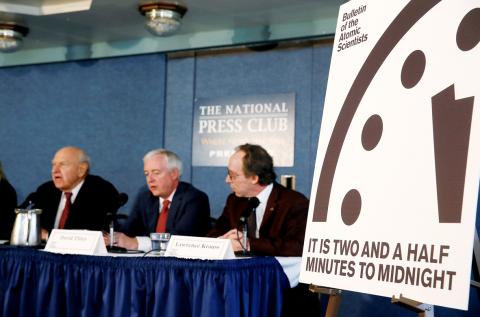It is getting closer to midnight.
On Thursday, the group of scientists who orchestrate the Doomsday Clock, a symbolic instrument informing the public when the Earth is facing imminent disaster, moved its minute hand from three to two-and-a-half minutes before the final hour.
It was the closest the clock had been to midnight since 1953, the year after the US and the Soviet Union conducted competing tests of the hydrogen bomb.

Photo: Reuters
Though scientists decide on the clock’s position, it is not a scientific instrument, or even a physical one. The movement of its symbolic hands is decided upon by the Science and Security Board of the Bulletin of the Atomic Scientists.
The organization introduced the clock on the cover of its June 1947 edition, placing it at seven minutes to midnight. Since then, it has moved closer to midnight and farther away, depending on the board’s conclusions.
Thursday’s announcement was made by Rachel Bronson, the executive director and publisher of the bulletin.
She was assisted by theoretical physicist Lawrence Krauss, climate scientist and meteorologist David Titley, and former US ambassador Thomas Pickering.
Bronson, in a post-announcement interview, explained why the board had included the 30-second mark in the measurement.
She said it was an attention-catching signal that was meant to acknowledge “what a dangerous moment we’re in, and how important it is for people to take note.”
“We’re so concerned about the rhetoric and the lack of respect for expertise that we moved it 30 seconds,” she said.
“Rather than create panic, we’re hoping that this drives action,” she said.
In an opinion piece for the New York Times, Titley and Krauss elaborated on their concerns, citing the increasing threats of nuclear weapons and climate change, as well as US President Donald Trump’s pledges to impede what they see as progress on both fronts, as reasons for moving the clock closer to midnight.
“Never before has the bulletin decided to advance the clock largely because of the statements of a single person,” they wrote. “But when that person is the new president of the United States, his words matter.”
In 1990, at the end of the Cold War, the clock was at 10 minutes to midnight. The next year, it was a full 17 minutes away, at 11:43.
However, over the next two decades the clock slowly ticked back. By 2015, the scientists were back in a state of unmitigated concern, with the clock at three minutes to midnight, the closest it had been since 1984.
“Unchecked climate change, global nuclear weapons modernizations, and outsized nuclear weapons arsenals pose extraordinary and undeniable threats to the continued existence of humanity,” the bulletin said.
“World leaders have failed to act with the speed or on the scale required to protect citizens from potential catastrophe,” it said.
“These failures of political leadership endanger every person on Earth,” it added.

A Ministry of Foreign Affairs official yesterday said that a delegation that visited China for an APEC meeting did not receive any kind of treatment that downgraded Taiwan’s sovereignty. Department of International Organizations Director-General Jonathan Sun (孫儉元) said that he and a group of ministry officials visited Shenzhen, China, to attend the APEC Informal Senior Officials’ Meeting last month. The trip went “smoothly and safely” for all Taiwanese delegates, as the Chinese side arranged the trip in accordance with long-standing practices, Sun said at the ministry’s weekly briefing. The Taiwanese group did not encounter any political suppression, he said. Sun made the remarks when

The Taiwanese passport ranked 33rd in a global listing of passports by convenience this month, rising three places from last month’s ranking, but matching its position in January last year. The Henley Passport Index, an international ranking of passports by the number of designations its holder can travel to without a visa, showed that the Taiwan passport enables holders to travel to 139 countries and territories without a visa. Singapore’s passport was ranked the most powerful with visa-free access to 192 destinations out of 227, according to the index published on Tuesday by UK-based migration investment consultancy firm Henley and Partners. Japan’s and

BROAD AGREEMENT: The two are nearing a trade deal to reduce Taiwan’s tariff to 15% and a commitment for TSMC to build five more fabs, a ‘New York Times’ report said Taiwan and the US have reached a broad consensus on a trade deal, the Executive Yuan’s Office of Trade Negotiations said yesterday, after a report said that Washington is set to reduce Taiwan’s tariff rate to 15 percent. The New York Times on Monday reported that the two nations are nearing a trade deal to reduce Taiwan’s tariff rate to 15 percent and commit Taiwan Semiconductor Manufacturing Co (TSMC, 台積電) to building at least five more facilities in the US. “The agreement, which has been under negotiation for months, is being legally scrubbed and could be announced this month,” the paper said,

MIXED SOURCING: While Taiwan is expanding domestic production, it also sources munitions overseas, as some, like M855 rounds, are cheaper than locally made ones Taiwan and the US plan to jointly produce 155mm artillery shells, as the munition is in high demand due to the Ukraine-Russia war and should be useful in Taiwan’s self-defense, Armaments Bureau Director-General Lieutenant General Lin Wen-hsiang (林文祥) told lawmakers in Taipei yesterday. Lin was responding to questions about Taiwan’s partnership with allies in producing munitions at a meeting of the legislature’s Foreign Affairs and National Defense Committee. Given the intense demand for 155mm artillery shells in Ukraine’s defense against the Russian invasion, and in light of Taiwan’s own defensive needs, Taipei and Washington plan to jointly produce 155mm shells, said Lin,